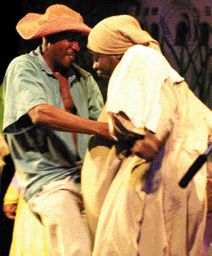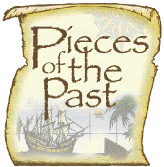 |
|
Stock
photograph.
|
"Proverbs
are short sentences drawn from long experience."
Cervantes, Don Quixote, 1605.
By
Dr. Rebecca Tortello
Proverbs
can be defined as short excerpts from stories about life's lessons.
Replete as they are with cultural symbolism, proverbs convey important
ideas about human nature, health and social relations that often transcend
their culture of origin, even though occasionally to fully understand
their meaning some grounding in that culture is helpful. Proverbs are
timeless, succinct, clever, often funny and usually memorable. Although
they can poke fun many express a desire for tolerance and respect. Many
also express similar ideas, reflecting the idea that there is often
more than one way to say any one thing. Many, like folk tales and fables,
also use animals to depict human behaviour, thereby allowing, as does
the practice of wearing masks in jonkunno or carnival, a wider means
of identification and expression by removing any fear of recognition.
In slavery, of course, this idea of coded personal expressions took
on even greater importance.
A GENERAL HISTORY OF PROVERBS
The purpose of most proverbs is to teach about survival. They are created
in several different ways: some are simple platitudes which, because
they seem to have universal application, become commonly regarded as
small bits of wisdom. Some are derived from actual tales or fables,
others from the Bible or literary texts such as Shakespearean plays.
Usually, however, it is the act of repetition that elevates an assertion
to proverbial status.
In
Jamaica, proverbs stand as examples of creolization "a cultural
action, material, psychological or spiritual based upon the stimulus
response of individuals to their environment and as white/black, culturally
discrete groups to each other" (Braithwaite, 1971, p, 26). Our proverbs
reflect African and European influences
and are uniquely Jamaican. As in many cultures, the ability to understand
proverbs rests on the level of familiarity one has with a particular
culture.
Today,
perceptions abound that Jamaican children's self-awareness, their sense
of pride, is being eroded due to exposure to American television, music
and merchandise. As a result, Jamaican academics and policymakers repeatedly
cite the island as in a state of cultural chaos. Cultural systems, they
warn, are under threat not only by foreign influences but from lack
of recognition by Jamaicans themselves. To that end, the following proverbs,
a short list of 20 taken from lists of hundreds, some common, others
not so common, are presented here to challenge readers of all ages to
see how in touch they are with what has been called one of the strongest
roots of Jamaican culture. After you make your guesses, take some time
to reflect on the wit and wisdom contained in these short statements.
Sources:
Braithwaite, E. (1971). The Development of Creole Society in Jamaica.
Oxford: Clarendon Press. Morris-Brown, V. (1993). The Jamaica Handbook
of Proverbs. Jamaica Island Heart Publishers.
QUIZ
TIME!
Can you complete these Jamaican proverbs?
The following proverbs are written in a loose combination of standard
English and patois in an attempt to reflect the two languages
commonly used on the island and out of a dual respect for the fact that
this will be read rather than heard and the fact that proverbs themselves
are bastions of the oral tradition, having survived orally for over
hundreds of years.
See if you can
fill in the blanks.
1.
"One, one coco ____ basket" (Do
not expect to achieve success overnight).
2. "Every mikkle ____ a mukkle" (Every
little bit counts).
3. "Wat doan
____, will fatten" (Do
not waste time worrying over something that does you no real harm. You
may even be able to turn it around into something positive).
4. "Chicken merry, _____ dah near" (Be
vigilant as danger can be found in unexpected places).
5. "Every
dawg has his day and every puss his ___ o'clock" and cock mouth ____
cock. (Do
not act as if you are better than others, your day will come).
6. "Wanti, wanti, cyan getti, getti, getti nuh _____" Also "silent rivah
run deep" and "No mug no bruk, no coffee nuh dash wey" (Count
your blessings and do not take what you have for granted).
7. "Sorry
fi mawga dog, mawga dog wi tun round and ____ you" (Sometimes
it is those whom we help who are the least grateful).
8. "Duppy know ___ fi frighten" (Bullies
know to pick on those least able to defend themselves).
9. "See mi
a one thing, come lib with me ________" (To
see me is one thing, to live with me, another or as in another popular
saying, do not judge a book by its cover).
10. "De olda de clock, de ______ it wine" (The
older a person is, the wiser).
11. "When
coco ripe, it mus ____" (Actions
speak louder than words).
12. "Hog say, 'de first dutty water mi ______, mi wash'." (Seize
opportunities as they present themselves).
13. "One eye
man king in ______ man country". (No matter how bad it seems things
may be, there is always another for whom things are worse).
14. "Fool-fool pickney mek fowl _____ away from him two time"
(Never allow yourself
to be fooled the same way more than once).
15. "Nuh fatten
cockroach fi _____" (Do
not waste time doing things for which others will be ungrateful).
16. "Saltfish sit down pon di _______ a wait fi bread and butter"
(Lazy people wait
for life's blessings to come to them).
17. "Mi old,
but mi nuh _____" (Do
not underestimate the value of the elderly).
18. "Disobedient pickney _____ rockstone" (Disobedient
children will come to a bad end).
19. "Dawg
say if him have money him would buy him own ______" (Some
people, when they wind up with money, will waste it in unnecessary things).
20. "Talk and ______ your tongue" (Think
before you speak).
ANSWERS:
1. full. 2. mek. 3. kill. 4. hawk. 5. four
6. wanti. 7. bite. 8. who. 9. another. 10. faster.
11. bus 12.
ketch 13. blind 14. get 15. fowl.
16. counter. 17. cold. 18. nyam. 19. fleas. 20. taste.
Coming
April 21:
This series explores the recollection of World War II... from two men
who experienced it..



